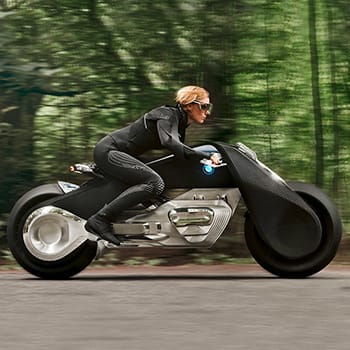
Take a look at the new BMW Motorrad Zero Emission Engine concept bike – Glasses instead of a helmet, light clothing, full balance without a stand: just three of a great many aspects which could become standard in motorcycling and give that feeling of freedom a new dimension in an increasingly digital world. And the best thing about it: this vision vehicle is already here. Introducing the BMW Motorrad VISION NEXT 100.The futuristic two-wheeler glides silently through the hall. In the curve in front of the stage, the frame bulges out and the BMW logo affixed on the size illuminates in blue and white. The rider, equipped with a black suit and stylish glasses, brings her vehicle to a stop and remains poised in that position without taking a foot off the frame. It’s like a scene from a sci-fi film. And although it does all happen in the motion picture capital Los Angeles, it is nevertheless absolutely real. The vision vehicle, which is celebrating its world premiere at the “Iconic Impulses. The BMW Group Future Experience” exhibition, catapults you into the 40s of the 21st century.
A time when mobility is yet more diverse and interconnected; a time when digitalization takes on a shape which we today perceive to be surreal; a time when motorcycling becomes an analogue and at the same time extraordinarily emotional experience. “The motorcycle provides my escape from everyday life. From the moment I climb on board, I experience nothing but absolute freedom – The Great Escape,” says Edgar Heinrich, head of design at BMW Motorrad.
[kad_youtube url=”https://youtu.be/5ttEkFMwLbk” width=800 height=500 ]
Together with his design team, Edgar Heinrich drafted this future scenario and designed the BMW Motorrad VISION NEXT vision vehicle based on that. “When we develop a motorcycle, we are usually thinking around five to ten years in the future. So taking a look further into the future was especially exciting for us and highly appealing,” Edgar Heinrich paints the picture. Designers are assuming that in 20 years, most vehicles will be driving around autonomously. Life will more often take place in urban environments and be organized by digital services. More and more digital, more and more interconnected, more and more automated. This thought made it clear what importance will be attached to analogue islands which give humans back that feeling of freedom.
Freedom means experiencing the environment with all your senses, and feeling centrifugal forces, acceleration and the wind. Ideally without a helmet or protective clothing. And with the BMW Motorrad VISION NEXT 100, you don’t need this any more either. Because the “digital companion” – a functional unit consisting of motorcycle and our own version of rider’s equipment – ensures a high degree of safety. The digital companion acts imperceptibly in the background and always intervenes when required or desired. “It was important to us that the analogue riding experience would remain undisturbed. The display and operating concept acts so discreetly that it creates a natural and familiar movement,” explains Holger Hampf, head of design, customer experience, at the BMW Group.
All new – and yet the BMW Motorrad VISION NEXT 100 still captures elements from the BMW Motorrad timeline: black triangular frame, white lines, classical opposed-twin engine type. In the side-on view, the vision vehicle looks naked. Accordingly, ergonomics and seat position are set up like on a roadster. The design of the front is minimalistic and refined with high-quality detailing. Above the front wheel, a large metallic reflector is integrated in the frame. It serves as a wind guide and together with the integrated windscreen, ensures aerodynamically optimized airflow.
Body elements like the seat, the upper frame cover and the front-wheel cover are made of carbon. Two intricate red light fixtures beneath the seat serve as the tail light and turn indicators. The tyres have a damping function and actively adapt to the terrain. The red rocker arm on the right handlebar stands out. Designed as a consciously mechanical element, it blocks the throttle grip or releases it.
The frame follows the wheel.
The black triangular frame is visually reminiscent of the R 32 from 1923 – the first BMW motorcycle. However, the frame has functionally little to do with the original. The Flexframe is flexible and allows steering manoeuvres without the joints we are familiar with today. If the handlebars are moved, the entire frame changes shape and facilitates the change in direction. Depending on the traffic situation, the forces required for this vary: steering manoeuvres are especially easy at a standstill, while the frame firms up at high speeds. The surfaces are attached so that they offer the wind and weather protection of a fully enclosed motorcycle. The surface of the frame is made of matt black textile. The BMW Logo affixed to the frame lights up blue and white during the ride.
